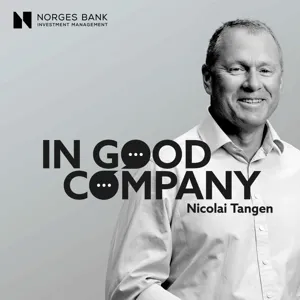Podcast Summary
Experiences and self-expression in luxury: Luxury goes beyond products and stores, it's about providing unique experiences and allowing self-expression.
Luxury is not just about products or stores, but rather it's about providing experiences that help people achieve their goals of looking and feeling better, as well as expressing themselves. A good luxury brand goes beyond a well-known name, it also has distinct attributes that resonate with customers, making the brand well-defined and attractive. Luxury and high-end items are not the same, as luxury is not only a personal dialogue with a product, but also a way to express oneself to others. Tiffany, for example, is an attractive luxury brand due to its well-known name and the numerous attributes associated with it, such as Audrey Hepburn, diamonds, New York, and 57th Street. These foundations provide a strong base for building brand strategies.
Creating a Luxury Brand: Past Meets Present: To build a successful luxury brand, focus on creating a dialogue between the brand's heritage and modernity, catering to both high-end and accessible markets.
Building a luxury brand from scratch is a challenging process that requires time, luck, and a strong connection between heritage and modernity. The product is a crucial element, making the difference in both the short term and the long term. The luxury market is driven by the upper middle class, and it's essential to understand the nuances of this demographic. Luxury brands are not just about high-end products and wealthy clients; they also cater to the affluent market with more accessible price points. To succeed, luxury brands must create a dialogue between the past and the present, establishing roots and a strong identity.
Building a Luxury Business Empire: Success in the luxury industry requires strategic vision, exceptional brands, and effective management to convince affluent individuals of exceptional value.
The luxury business is not about selling large volumes, but rather convincing affluent individuals with discretionary money of the exceptional value of luxury products. Bernard Arnault, the founder of LVMH, identified the potential of luxury 30 years ago and built a business empire by developing and managing exceptional brands with a sophisticated management system. The key to success in the luxury industry is not only strategic vision but also hard work and the ability to develop and manage multiple brands effectively. Personal experience with luxury brands, such as Loro Piana, can create a sense of addiction and reinforce the value of these products. Despite the massive success of LVMH, with a value equal to Denmark's GDP, the journey to build such a company requires a combination of strategic sense, exceptional brands, and effective management.
Moët Hennessy CEO's Dedication to Luxury Industry and Customers: Moët Hennessy's success in the champagne market is due to strategic investments in distribution networks, allowing them to reach top clients and gradually raise bottle prices, with CEO Bernardo Hees' deep industry knowledge and dedication to customers keeping him engaged and active.
Bernardo Hees, the 73-year-old CEO of Moët Hennessy, continues to work tirelessly due to his deep knowledge of the luxury industry and its many brands, as well as his dedication to staying close to customers. Moët Hennessy holds a nearly monopolistic position in the champagne market, with control of high-end brands like Dom Perignon, Krug, and Ruinart. They achieved this success through strategic investments in distribution networks, allowing them to reach top clients and gradually raise bottle prices. Despite strict marketing regulations in many locations, distribution investment is crucial for staying competitive and maintaining a strong presence with customers. Hees' commitment to the industry and his customers keeps him engaged and active, demonstrating that hard work and knowledge are key to staying young and successful.
Understanding market conditions during luxury industry acquisition cycles: Successful luxury acquisitions depend on accurately assessing market conditions, including the bid-ask spread, and making assumptions about target earnings multiples during upturns.
The luxury industry follows an acquisition cycle, and it's crucial to understand the market conditions during the cycle to make successful acquisitions. The bid-ask spread, which represents the difference between the price a buyer is willing to pay and the price a seller is willing to accept, is a significant factor. In good times, the bid-ask spread is small as buyers anticipate future growth, and sellers look back at past performance. However, in tough economic conditions, the spread widens, making it difficult to determine the bottom of the cycle. Consolidation in the luxury industry typically occurs during upturns, and attempting to "bottom fish" during downturns is risky. Furthermore, luxury acquisitions are often made on the upswing, so it's essential to have accurate assumptions about the target's earnings multiples to deliver value to shareholders. Lastly, while friendly acquisitions can occur, not all deals are friendly, and navigating the complexities of the luxury industry requires careful consideration.
Complexities of US acquisitions: Departure of Tiffany's management: LVMH eyes expansion in high-end watches, wine & spirits, and skincare, looking for desirable brands to fill portfolio gaps
The acquisition of Tiffany by LVMH was a complex process due to the US system of golden parachutes, leading to the departure of most of Tiffany's management team. However, this isn't unique to hostile takeovers and is a common occurrence in US acquisitions. Moving forward, LVMH identifies gaps in their portfolio, specifically in the high-end watch and wine & spirit categories, as potential areas for acquisition. Brands like Audemars Piguet and fabulous whisky brands are desirable additions to their portfolio, as they complement their existing champagne and cognac businesses. Additionally, LVMH aims to expand in the skincare sector, which is underdeveloped compared to competitors like Estee Lauder and L'Oreal. Acquisitions would enable them to fill these gaps, but opportunities depend on whether they become available. LVMH remains patient and prepared to move quickly when opportunities arise.
Luxury for self-accomplishment and pleasure: Luxury brands cater to all ages and price points, providing unique feelings and self-indulgence, with cultural factors also influencing appeal.
Luxury brands appeal to the younger generation not just for status or security, but for self-accomplishment and self-pleasure. Luxury goods, no matter the price point, provide a unique feeling and sense of satisfaction. The ubiquity of luxury brands in terms of pricing allows different people to access and experience luxury in their own way. For instance, a Chanel lipstick may not be expensive, but it is still considered a luxury item due to the brand's reputation for quality and desirability. The price range of luxury brands caters to various consumers, all united by the common thread of wanting to please themselves and look good. Cultural issues also play a role in the appeal of luxury brands, as they often represent exclusivity, craftsmanship, and a desirable lifestyle. Ultimately, luxury is about the feeling of accomplishment and self-indulgence, and it starts at any age.
LVMH's Success: Openness and Preparing the Next Generation: Europe's wealthiest man, Bernard Arnault, values diverse opinions and grooms the next generation for LVMH's leadership, ensuring a successful succession process for the family and shareholders.
Openness to different opinions and the ability to groom the next generation are key factors in the success of family-run businesses like LVMH. Bernard Arnault, Europe's wealthiest man, welcomes diverse viewpoints and has occasionally changed his mind as a result. However, he ultimately makes decisions based on his own beliefs. The next generation of LVMH leaders is being prepared through hands-on experience and education in the luxury industry. Bernard Arnault's dedication to the business and desire to pass it on to capable individuals ensures a smooth succession process in the best interests of the family and shareholders. For those looking to enter the luxury goods industry, sending a resume to the HR division is a good first step, as talent acquisition is a top priority.
Learning from sales for a successful career: Starting a sales career provides valuable insights into clients and markets, essential for a career in finance or other industries.
Starting a career in sales is essential for building a strong understanding of clients and the market. This knowledge can then be applied throughout one's professional journey in finance or other fields. By being in direct contact with clients, one can gain insights into their needs, preferences, and reactions to marketing strategies. This understanding is crucial for evaluating the strengths and weaknesses of products and effectively implementing successful marketing campaigns. While it's not necessary to stay in sales long-term, starting there can provide valuable skills and knowledge that benefit a career in finance or other industries.






